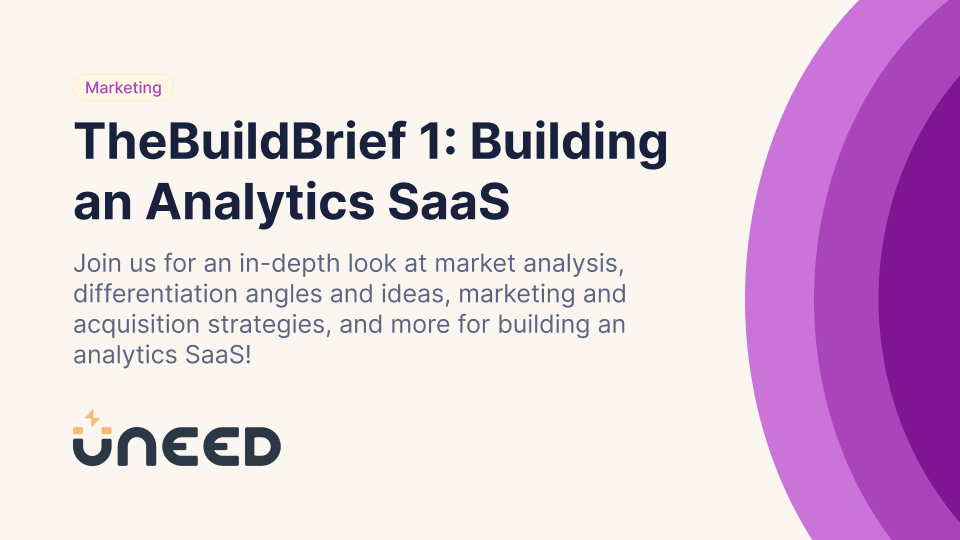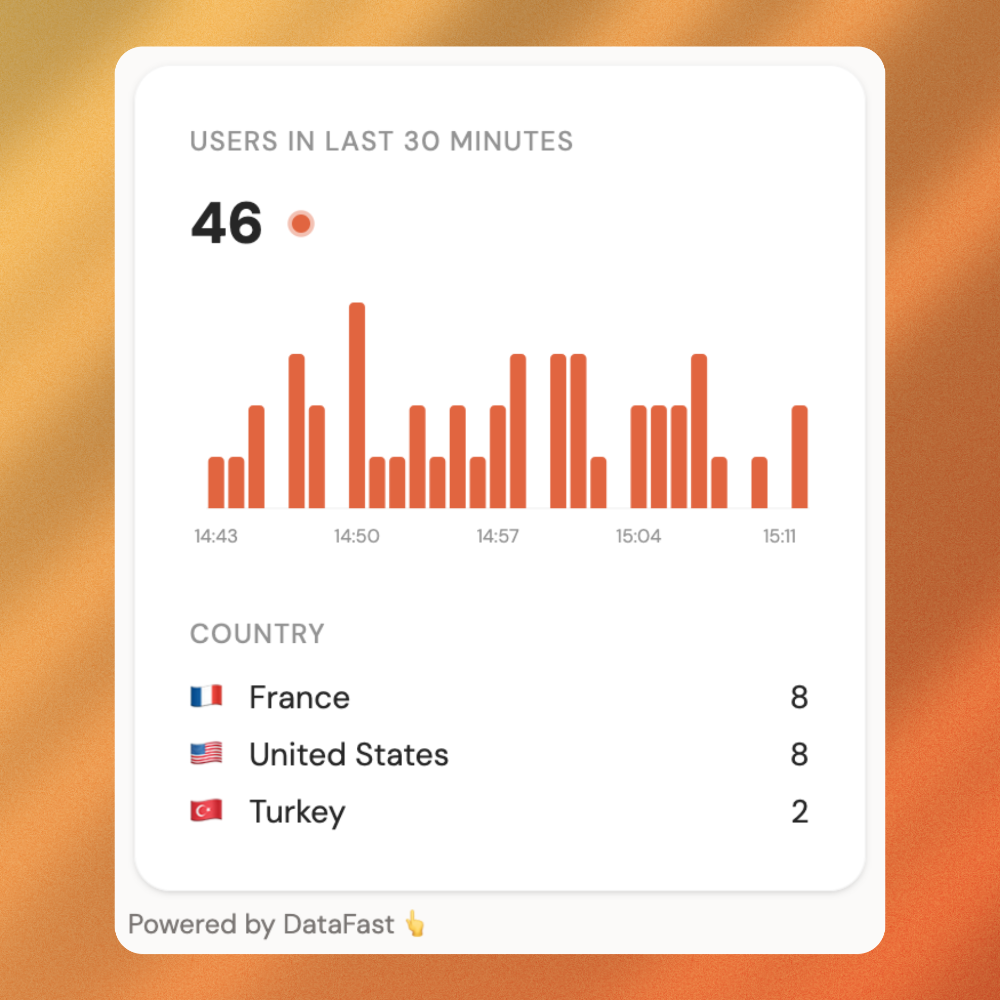
TheBuildBrief 1: Building an Analytics SaaS
Join us for an in-depth look at market analysis, differentiation angles and ideas, marketing and acquisition strategies, and more for building an analytics SaaS!
Hey there 👋🏻,
Welcome to this first edition of our new series: TheBuildBrief!
After spending 6+ years running Uneed, testing hundreds of products and writing 70+ reviews, I've gained a lot of experience, ideas, opportunities and perspective (I know, I'm modest).
Every week, I see dozens of successful - and unsuccessful - products launch on Uneed. I analyze what works, what doesn't, and most importantly - what's missing. The gaps are everywhere, but most builders don't know how to spot them: this is were I can help 👀.
That's why I decided to create TheBuildBrief.
Every 1 or 2 weeks, I'll share one specific product idea, and will break it down:
🔍 Market analysis - What's working right now 💡 Differentiation angles and ideas - How to stand out 📈 Marketing and acquisition strategies - What actually drives growth 👤 Is this for you? - Is this actually for you?
No fluff - just actionable insights from someone who's seen thousands of products succeed and fail. Think of it as your weekly market intelligence briefing, straight from the trenches of the indie ecosystem 😎⚔️
The SaaS analytics market has exploded in recent years, and is now highly fragmented. Even if “normal” people (i.e., not you 🙃) only know about Google Analytics, there are plenty of alternatives, and many of them are run by indie hackers!
This is a rather easy idea to build, but a complicated one to market and grow.
Let's see what we can do 😎
🔍 Market analysis
- Wide Angle Analytics: A privacy-focused web analytics run by an indie hacker for years. Not an open startup, but looks solid and is probably profitable.
- Vemetric: Has just launched on Uneed! New web analytics platform, also run by an indie hacker. Doesn't have a lot of features, nor any particular angle or differenciation. We'll talk about this later!
- Plausible: We cannot talk about analytics without mentioning Plausible, probably the most known alternative to Google Analytics. Run by a small indie team, and self hostable!
- Logsnag: This one is a bit different from the others. It defines itself as a "Realtime monitoring tool for your entire business.". You probably heard of it 👀
- Datafast: An analytics SaaS by Marc Lou, which allows you to link your analytics to your revenues.
We're going to use these 4 SaaS as examples throughout this issue, and analyze why they work or don't work, what they could do better, and above all what YOU could do in this market!
💡 Differentiation angles and ideas
Some of these products stand out from the rest: they're open source and can be self-hosted (Plausible), they're privacy-focused (Wide Angle), they give you a new way to analyze your data (Datafast) or they're completely rules-breaking (Logsnag).
IMO, you won't win by building an analytics SaaS focused on privacy or open source: it's too late. The right moment has passed, and the market is already saturated.
From my point of view, you have two choices:
- 1️⃣ You accept to grow slowly. Very slowly. You don't do anything differentiating, you just make a very good product, tell everyone around you about it for years and look for stable, long-term acquisition channels. It's not the stuff of dreams, but it could work. You probably won't get people who already use an analytic to switch to yours: you'll have to focus on newcomers, new devs or new projects that don't yet have a preferred analytic.
- 2️⃣ You find a unique angle or feature. Your goal will be to get people who are already using an analytics tool to see yours and say “ah yes, that would be super useful, I'm willing to spend time switching analytics to get it”. That's easier said than done.
Here are a few ideas:
- Vertical-specific : E-commerce, SaaS, newsletters, podcasts, any specific product with a huge customer base and an API… Choose a niche, focus on that niche, understand it, and build your whole product around them, packed with special features. If you have trouble finding your niche, make a list of all the apps and websites you use every week, and ask yourself if you could build an analytics product for it. Is there a market? Is it technically possible?
- AI-focused : Build a classic web analytics product, but packed with some AI features. For example, AI could explain “trends” in English: which pages are working well or not so well, changes in user behavior etc. It could also suggest improvements: linking opportunities between your pages to improve your SEO, sources - backlinks - on which you can double down, etc.
- Aesthetic focused : Over the years, I saw a few products succeeding only because they were carefully designed. Build the most flexible, versatile and beautiful dashboard possible, with which you can display the data you want in the form you want, and hide the data you don't want. Combine this with automatic creation of beautiful screenshots that can be shared on social networks, add a whitemark if you like, and go all-in on social media. This is a huge bet, but I think it can work 👀.
- Integrations : Like Marc Lou did with Datafast, try to find some metrics you can display alongside your analytics. It can even be the same metric, but with different integrations: why not build Datafast, but for Shopify? Speaking of Datafast, did you see this little thing on their landing page ? 👇🏻

- Widgets : This is a simple feature you can add to your existing analytics SaaS. Keeps the "powered by your_product_name", make it a link, and you've got yourself a backlink.
📈 Marketing and acquisition strategies
- PSEO : SEO is not dead, and PSEO neither. You could generate landing pages for every usecases (Wide Angle does it, but you could do it a bit better with a proper landing 😄) like "Analytics for bloggers", "Analytics for Agencies" etc. But also go after comparison keywords: "Competitor alternative", "Best analytics for niche". The key is to actually customize the content for each landing, not just change the title.
- Free Tools : Build simple, useful tools that naturally lead to your main product. Think "UTM builder", "GA4 to readable reports converter", or "Website speed checker". Host them on subdomains for extra SEO juice, and always include a subtle CTA to your main analytics tool. A LOT of successful products have free tools to generate traffic, and a lot of them… hide them 👀. Don't believe me? Here are those from Logsnag. You won't find a link on their website, but you can analyze their sitemap… 😏
- Social Media : If you bet on the "Aesthetic focused" angle we mentioned earlier, Social Media will be your main acquisition channel. It can also be if you already have a good follower base, or the motivation to create a lot of content.
- Partnerships : Partner with website builders, no-code tools, or marketing agencies. You can find a lot of them on Uneed 😎. Offer them a revenue share for referrals, or even a dedicated plugin. Most analytics tools ignore this channel, but it can be a goldmine for consistent growth.
👤 Is This For You?
- Technical skills : Backend dev mandatory, data processing experience helpful. You'll need to handle high-volume data ingestion, real-time processing, and complex queries. AI can help!
- Design sense : Dashboards need to be beautiful AND functional
- Patience : This isn't going to be an overnight success. 12-18 months before meaningful revenue, easily. Analytics is a crowded space, and building trust takes time. You'll need runway to survive the slow early growth.
- Market knowledge : Understanding user behavior patterns, conversion funnels, and what metrics actually matter to businesses. If you've never run marketing campaigns or analyzed website performance, you'll probably struggle to build something people want. You can learn, though!
Conclusion
That's it 😊. I hope you liked this first issue. If you have any remark/ideas, about it or for the next one, feel free to reply to this email.
Thomas from Uneed
Sevalla Review - The modern Heroku alternative developers have been waiting for in 2025
We've tested Sevalla, the modern Heroku alternative that promises transparent pricing and all-in-one platform capabilities for developers.
TMetric Review - The effortless time tracker to keep your team on track in 2025
We've tested TMetric, a time tracking for teams and productivity management tool that helps streamline business operations.